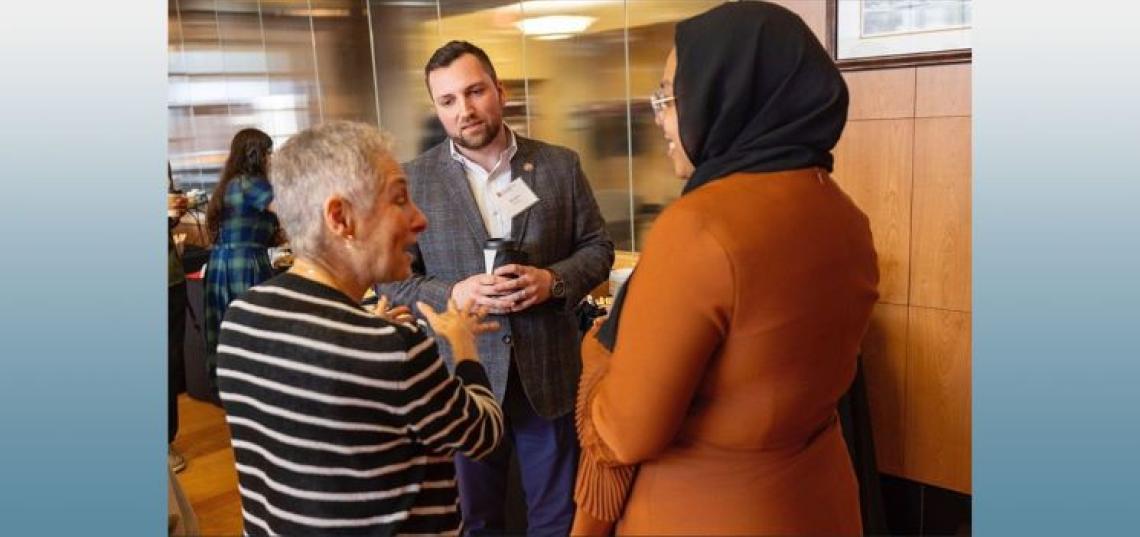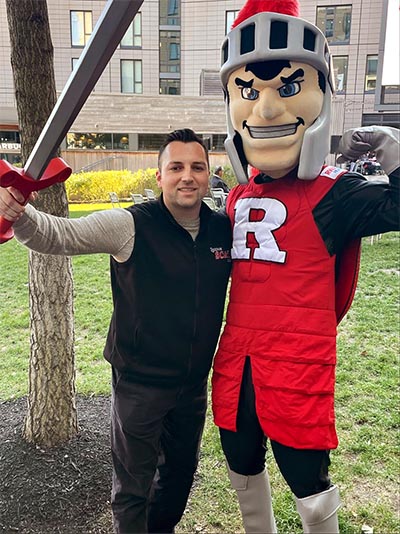
Assistant Dean for Development Blain Bradley joined the Rutgers School of Communication and Information and the Rutgers University Foundation in July 2023. After a full year of setting goals, building relationships, and working toward the greater good for the SC&I community, Bradley took time to reflect on his progress and answer our questions.
SC&I: What attracted you to this position and to the Rutgers School of Communication and Information (SC&I) in particular?
BB: I graduated from the University of Alabama with a degree in journalism, and I wondered, “How will I use this, or when will it come full circle for me?” I grew into a rewarding career in fundraising, obtained my MBA from Louisiana State University, and saw an opportunity to lead fundraising efforts for SC&I. That was my “full circle” moment—to come back and represent my home state at Rutgers, nurture my academic passions, and grow as a fundraiser. It was also an opportunity to switch from private university fundraising to public. The challenge of working at a larger school was intriguing.
SC&I: Can you describe your first impressions when you started in this role?
BB: Immediately, I could sense the drive and passion of staff and faculty to provide an unparalleled learning experience for students. I immediately connected with our dean, attended a conference, and connected with alums in Washington, D.C. I connected with Assistant Professor of Professional Practice, Communication Mark Beal and worked on some corporate projects, which led to a solid collaborative relationship. Right away, I sensed that folks at SC&I were motivated and willing to collaborate with me, which made my transition into the new role much more accessible and enjoyable.
SC&I: What are some of the major milestones or achievements you’ve accomplished in your first year?
BB: We engaged several retired faculty members in philanthropic conversations, which cemented their legacies at SC&I. They have made such great academic contributions and now have committed to bettering the school beyond their tenure as faculty. I’ve re-engaged and discovered a new number of highly accomplished and diverse alums from Pittsburgh to Chicago, Miami to Los Angeles, and everywhere else. We have so many amazing alums nationwide, and we’re creating pathways to connect them and support our work and students.
SC&I: Can you share a particularly memorable or impactful gift/donation that you helped secure?
BB: I’m proud of the work we have done with Warner Bros. Discovery. I was fortunate to meet with an alum in an executive role at WBD and learn about his desire to give back and engage students. We were approaching our annual COMMChella fest, hosted by Mark Beal and the Communication Department, and we were looking for more corporate support. I arranged meetings between Beal, Professor of Communication and Chair of Communication Marya Doerfel, and WBD. We secured support from WBD for COMMChella, both financially and experientially. It was terrific to have them on site engaging with students. We are now strengthening that relationship, and they’ll be featured as the main company in one of Beal’s fall courses, in which students will engage with the company.
 SC&I: How have these contributions directly benefited the students, faculty, and programs at SC&I?
SC&I: How have these contributions directly benefited the students, faculty, and programs at SC&I?
BB: Students benefitted from WBD’s support by being able to connect with representatives, network, and find career opportunities, and now they’ll benefit in the academic space.
SC&I: What were some of the biggest challenges you faced in your first year, and how did you overcome them?
BB: Managing the size of Rutgers. I had a fantastic opportunity to navigate and work at two highly respected private institutions. Those presented their own challenges when it came to scaling down my work, and their alumni networks were much smaller yet still accomplished. Everything at Rutgers is bigger. You must create close communities, communicate strategically, and mentally reset yourself daily to succeed.
SC&I: Can you discuss any innovative strategies or approaches you implemented to enhance fundraising efforts?
BB: I operate in a very thought-out way. My personal philosophy on making each day productive relies on my reflections of Maslow’s Hierarchy of Needs. I fully believe that a person cannot or should not force themselves to be in a situation that would put them ahead of each sequential pyramid level (physiological, safety, love and belonging, esteem, self-actualization). I apply this to building relationships with prospective donors. I work hard to ensure that we build an authentic relationship in which we agree that the individual has reached a point of feeling self-actualized and is ready to create an impact. I never want to be seen as someone creating a transactional relationship for our school through questionable persuasive tactics or one-dimensional support. I make sure donors are offered several ways to decide how to give back—financial, volunteer, or intellectual capacity. It’s much more natural and rewarding.
SC&I: How have you engaged with the SC&I community, including alumni, students, and faculty, to foster a culture of giving?
BB: I’ve built a strong sense of community amongst alums, students, and faculty by helping bridge any gaps. Although SC&I hosts three departments (Journalism and Media Studies, Library and Information Science, and Communication), we are working towards building a bigger sense of one community that is SC&I.
SC&I: Can you share any stories of collaboration with other departments or teams that led to successful fundraising campaigns?
BB: I think collaboration with all of SC&I departments have led to major success in year one. Relationships with Communication professors opened up doors for crucial meetings with esteemed alum and faculty, and chairs always made themselves available for research and resources before meetings with donors interested in their departments. I worked closely with our Foundation’s alumni affairs to bring in Richard Moran, a venture capitalist and SC&I Communication grad, to speak with 100 or so students, hosted by Director of Undergraduate Studies in Communication and Associate Teaching Professor of Communication Brian Householder. It was truly special.
SC&I: What are your long-term goals for the Foundation, and how do you plan to achieve them?
BB: My goal is to continue to be a dynamic, innovative, thought-provoking fundraiser who contributes and learns from the Foundation at the same time. I consider myself to be strategically bold but an ultimate team player at the same time. I want to grow at Rutgers as they see best fit and invest in the university as they invest in us as employees. I have a very deep passion for my work, and as a New Jersey native, I’m proud to have this opportunity to work for our state university.
SC&I: How do you see the role of philanthropy evolving at SC&I over the next few years?
BB: I’d like to find donors who want to work to improve SC&I. While departmental support is significant, we need to create a better sense of SC&I being one school and community, and we need to identify initiatives to do so.
SC&I: What has been the most rewarding aspect of your job so far?
BB: It’s incredibly rewarding seeing our students grow and benefit from the support that is provided to them by our wonderful benefactors. Students come from a variety of backgrounds, particularly a spectrum of different socioeconomic situations. We create opportunities to even the playing field for all students to obtain a world-class education, and that means the world to me.
SC&I: Can you share any personal anecdotes or stories that have inspired you in your role as Assistant Dean for Development?
BB: I’ve been working closely with a donor and have developed an excellent personal relationship with this person. In the initial stages, this person was working through the grieving process after the loss of a loved one, and they displayed great emotional intelligence and fortitude to get through this in public. But in our conversations, they were vulnerable and open with me. It allowed us to connect as humans. This job is multi-layered, and you need to be an empath at your core to enjoy it because if you build authentic relationships with people, different scenarios call upon your ability to listen and respond with compassion and care.
SC&I: Why do you believe it’s important for alumni and supporters to give back to SC&I?
BB: Certain pillars in our lives are the foundation of success, like our academic experiences, faith, family, friendships, and professional pathways. Times change, but the struggles students face and the goals of our educators remain the same in the sense that we aim to develop our students and put out world-class work through research. We can impact a number of people on the micro and macro level, but without the support, the ideas do not always become reality.
SC&I: What message would you like to convey to potential donors who might be considering supporting SC&I?
BB: At the very least, please inquire about how you can give back in any capacity. Put your financial situation aside and ask yourself, “What can I do to give back to students with my professional network, intellectual capabilities, or volunteerism?” If you find yourself giving back financially, those discussions will occur at some point when you feel comfortable approaching that topic. As a development specialist, I want prospective donors to understand I operate on a permission-based, trust-first, transparent platform. Let us know how you want to help. We can do this together.
SC&I: How can people get involved or learn more about giving opportunities?
BB: You can always reach me at blain.bradley@ruf.rutgers.edu or 848-932-8905.
